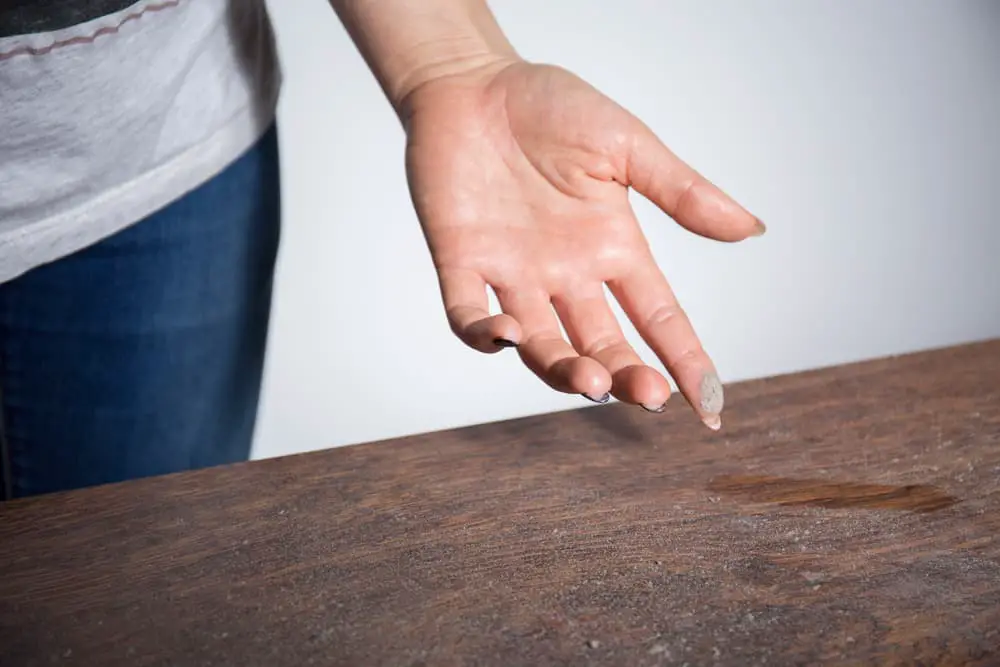Dust can be a great nuisance and disrupt your productivity at work.
However hard you try to clean it, you may find dust settling on your desk. And it becomes a real challenge.
So, Why Does Your Desk Get Dusty?
Dust can come from various sources, such as skin cells, fabric fibers, and soil. It’s an inevitable part of everyday life and can accumulate on surfaces. Your desk is no exception.
Three Ways That A Dusty Desk Affects Productivity
Dust on your desk can significantly impact your productivity, and keeping it to a minimum is essential.
Here are a few ways that dust can affect your productivity:
1. Distraction
Dust can be visually distracting, mainly if it accumulates on your computer screen or other surfaces you frequently see.
This can disrupt your focus and make it harder for you to stay on task.
2. Allergies And Related Ailments
For some people, dust can cause allergy symptoms such as sneezing, itchy eyes, and a runny nose.
People with breathing difficulties are the prime victims of allergies from dust.
Asthmatic patients, for instance, become sickly when exposed to such sheer allergens.
These symptoms can make concentrating difficult and lead to decreased productivity.
3. Damaged Equipment
Dust can also cause damage to your electronic equipment, such as your computer or keyboard.
If your equipment is not functioning correctly, it can slow you down and make it harder to complete tasks.
Not to mention that it can even cause permanent equipment breakdown and halt your progress.
Seven Reasons Why Your Desk May Get Dusty
There are several reasons why your desk may get dirty, even if you try to keep it clean.
Here are seven common culprits:
1. Lack Of Organization
If you don’t have a system for organizing your desk, it can quickly become cluttered with papers, pens, and other miscellaneous items.
This can make it difficult to find what you need and create a cluttered, overwhelming atmosphere.
2. Eating At Your Desk
It’s easy to get caught up in work and forget to take breaks, but eating at your desk can contribute to the mess.
Crumbs, spills, and dirty dishes can contribute to a messy desk.
3. Poor Hygiene Habits
Poor hygiene, such as not washing your hands regularly or covering your mouth when coughing or sneezing, can leave germs on your desk and contribute to a dirty work environment.
4. Using Your Desk As A Storage Space
Using your desk as a place to store everything is tempting, but this can lead to clutter and a dirty workspace.
It’s better to designate specific storage areas for your items and keep your desk clear.
5. Not Cleaning Regularly
Like any other surface, you need to clean your desk regularly to maintain its cleanliness.
If you don’t make time to clean your desk on a regular basis, it will inevitably get dirty. The result is poor productivity, a stinking desk, and allergies.
6. Lack Of Natural Light
Studies have shown that natural light can help improve mood and productivity and help keep your desk clean.
Natural light can help reduce the growth of bacteria and other germs on your desk.
7. Environmental Factors
Dust, pollen, and other particles can accumulate on your desk, especially if you don’t have good air circulation in your workspace.
Within no time, your desk will be littered will all manner of dust.
Eight Ways To Keep Your Desk Clean And Dust Free
1. Use A Desk Or Mouse Pad
These protective coverings can help to prevent dust and dirt from accumulating on your desk.
They also provide a smooth surface for your mouse or keyboard, which can help to reduce wear and tear on your desk.
2. Keep Your Desk Clean And Organized
A cluttered desk can attract dust and make it harder to clean.
Make a habit of putting away items when you’re finished, and consider using organizers or storage solutions to keep your desk tidy.
3. Dust Regularly
Regularly dusting your desk helps keep it clean and dust-free.
You can use a microfiber or a soft, dry cloth to wipe your desk and other surfaces in your workspace.
4. Use A Dusting Spray Or Furniture Polish
A dusting spray or furniture polish can help to pick up dust and keep it from settling back onto your desk.
When executing this, follow the manufacturer’s instructions and avoid using too much, as this can leave a residue on your desk.
5. Vacuum Your Desk
If you have a lot of dust or debris on your desk, a quick vacuum can help to remove it quickly and efficiently.
Just be sure to use a low-suction setting and a soft brush attachment to avoid damaging your desk.
6. Keep Windows And Doors Closed
Dust can quickly be brought in through open windows and doors if you have a lot of traffic in your office or workspace.
To keep your desk clean and dust-free, keep these openings closed as much as possible.
7. Use A Dust Cover
Consider using a dust cover for your computer and other electronic equipment to help keep dust at bay.
Dust can seriously impact your electronics if it finds its way inside them.
The last thing you want to do is to replace your computer and other devices.
8. Use A Desk Fan
Desk fans can help reduce the amount of dust by circulating the air.
You can hustle around your nearest stores for an ideal desk fan. It helps a great deal.
Wrapping up
Several reasons your desk may get dusty include indoor air quality, personal habits, poor cleaning habits, and location.
It’s essential to regularly clean and dusts your desk to keep it free of dust and other particles.
Sources
https://www.hunker.com/13419854/how-to-keep-your-desk-dust-free

